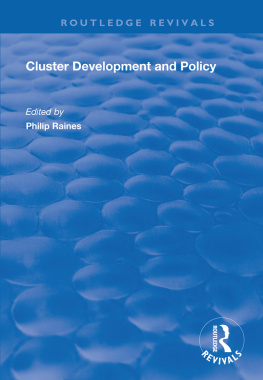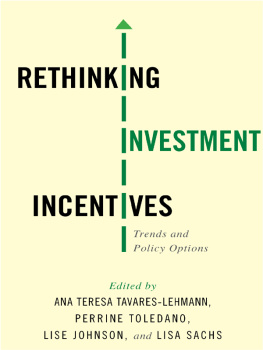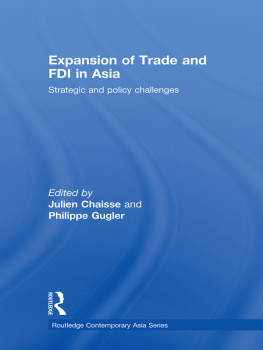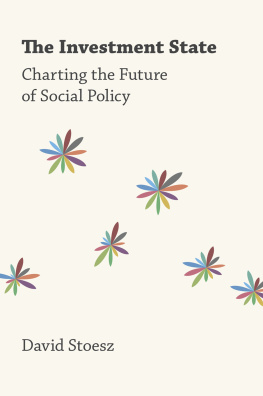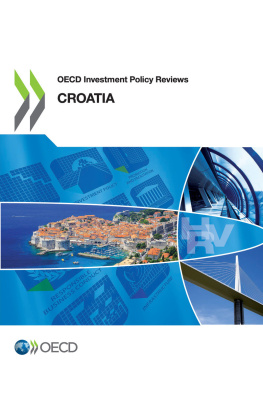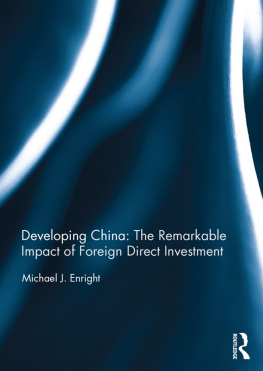POLICY COMPETITION AND FOREIGN DIRECT INVESTMENT IN EUROPE
Other titles in the collection
EU Enlargement
Cohesion and regional policy
Edited by John Bachtler, Ruth Downes and Grzegorz Gorzelak
Policy Competition and Foreign Direct Investment in Europe
Edited by
Philip Raines and Ross Brown
European Policies Research Centre
University of Strathclyde
Glasgow
First published 1999 by Ashgate Publishing
Reissued 2018 by Routledge
2 Park Square, Milton Park, Abingdon, Oxon, OX14 4RN
711 Third Avenue, New York, NY 10017, USA
Routledge is an imprint of the Taylor & Francis Group, an informa business
Copyright Philip Raines and Ross Brown 1999
All rights reserved. No part of this book may be reprinted or reproduced or utilised in any form or by any electronic, mechanical, or other means, now known or hereafter invented, including photocopying and recording, or in any information storage or retrieval system, without permission in writing from the publishers.
Notice:
Product or corporate names may be trademarks or registered trademarks, and are used only for identification and explanation without intent to infringe.
Publisher's Note
The publisher has gone to great lengths to ensure the quality of this reprint but points out that some imperfections in the original copies may be apparent.
Disclaimer
The publisher has made every effort to trace copyright holders and welcomes correspondence from those they have been unable to contact.
A Library of Congress record exists under LC control number: 98074932
ISBN 13: 978-1-138-32800-6 (hbk)
ISBN 13: 978-1-138-32801-3 (pbk)
ISBN 13: 978-0-429-44895-9 (ebk)
The OECD Development Centre has undertaken a wide-ranging programme of research to understand the relationship between government policy and global foreign investment flows. As part of this programme, it has commissioned a series of studies investigating the activities of governments in different global regions in attracting investment and how competition between governments has shaped the design and implementation of policy. A synthesis of the findings of the programme will appear in Charles Oman (forthcoming 1999) Policy Competition and Foreign Direct Investment (OECD Development Centre, Paris). Based on a review of existing research literature and statistical sources, the following report was produced on policy competition and the attraction of foreign investment in Europe. The information presented was current at the time of the study's production, that is, January 1998. The study was prepared by staff at the European Policies Research Centre based at the University of Strathclyde under the direction of Professor John Bachtler:
- Dr Ross Brown (Research Fellow)
- Dr Keith Clement (Associate Fellow)
- Ewa Helinska-Hughes (Research Fellow)
- Philip Raines (Senior Research Fellow)
- Fiona Wishlade (Senior Research Fellow)
The chapter on FDI policy in Central and Eastern Europe was written in collaboration with Professor Michael Hughes of the University of Stirling.
Philip Raines
Ross Brown
EPRC
Glasgow
The editors wish to acknowledge the advice and support of Charles Oman of the OECD Development Centre in the structure and content of the study, and Moira Lowe of EPRC for her patience in formatting the book for publication.
In addition, the following organisations are acknowledged for granting permission to use and reproduce copyright material.
In : United Nations, 1997. Table extracted from World Investment Report 1997 by kind permission of the Publishers, the United Nations.
In : European Communities, 1993. Table extracted from Regional Development - New Location Factors for Mobile Investment in Europe by kind permission of the Publishers, the Office for Official Publications of the European Communities.
In : OECD, 1991. Table extracted from Taxing Profits in a Global Economy: Domestic and International Issues by kind permission of the OECD.
In , quote: OECD, 1996. Quote taken from Tax Expenditures: Recent Experiences by kind permission of the OECD.
PHILIP RAINES AND ROSS BROWN
Foreign direct investment (FDI) has expanded rapidly throughout the world economy over the last two decades. This trend has been promoted by the removal of national barriers to capital movements and increasing globalisation, especially by multinational enterprises (MNEs). The aggregate stock of FDI in the world economy is estimated to have risen from 4.5 percent of world output in 1975 to 9.5 percent in 1994, with the value of sales by foreign affiliates of domestic companies exceeding the value of world exports by around a quarter (Barrel and Pain, 1997). Between 1980 and 1989, accumulated FDI inflows among developed countries were more than four times as large as during the 1970s, with FDI growing faster in the 1980s than GDP and trade by factors of four and three respectively (Neven and Siotis, 1993).
Widespread attention has been given to charting how the global rise in these investment flows has been associated with changes in the operation and inter-relationships of national and regional economies - such as the globalisation of production and increasing international economic interdependency. Less research has been carried out on the impact of rising FDI on government policy, not just on the overall objectives of economic policy, but the types of micro-economic and regulatory policies favoured by governments.
The policy impact is evident at different levels. International responses to FDI growth have included efforts to establish collective frameworks on the treatment of foreign investors, notably the OECD's Multilateral Agreement on Investment and the agreement brokered through the World Trade Organisation on trade-related investment measures (TRIMs). At national level, recognition of the role of foreign investment in regenerating local economies and creating employment has resulted in policies being specially devised for attracting and retaining FDI, involving the coordination of existing policy instruments, the creation of new ones, the allocation of increasing resources to FDI policies and the development of institutional structures for delivering different elements of these policies. The work of national governments has been mirrored by similar approaches taken sub-nationally, as regional governments and local authorities and agencies have pursued their own individual policies in competing for FDI.
In Europe, this process of FDI policy development at different levels has perhaps advanced further than elsewhere in the world. The importance of attracting foreign investment has been acknowledged by local and national governments as well as by larger groups such as the European Union. At the same time, the need to set competition within limits has also been recognised, leading to the emergence of detailed controls on industrial subsidies and incentives at European level by the European Commission. Although the nature of this competition is changing with the continent's realignment in response to the liberalisation and restructuring of the economies of Central and Eastern Europe (CEE), policy competition remains the driving force behind the scale and type of approaches to regulating and attracting foreign investment.


